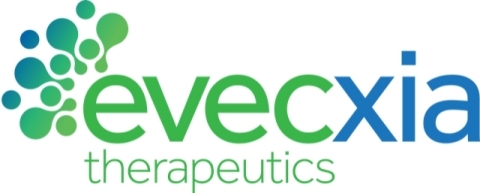Evecxia Therapeutics Reports Favorable Data From a Phase 1 Single-Ascending Dose and Multiple-Ascending Dose Trial of Adjunctive EVX-101 in Healthy Volunteers Treated With a First-Line Antidepressant
Evecxia Therapeutics Reports Favorable Data From a Phase 1 Single-Ascending Dose and Multiple-Ascending Dose Trial of Adjunctive EVX-101 in Healthy Volunteers Treated With a First-Line Antidepressant
- Putative therapeutic 5-HTP plasma exposures were achieved at all dose levels evaluated
- Pharmacodynamic biomarker data demonstrated target engagement, indicative of brain extracellular serotonin elevation beyond the first-line antidepressant effect
- The dose range was determined for the planned Phase 2 trial in Major Depressive Disorder patients inadequately responding to first-line antidepressant therapy
RESEARCH TRIANGLE PARK, N.C.--(BUSINESS WIRE)--Evecxia Therapeutics, Inc. today announced favorable safety, tolerability, pharmacokinetic, and pharmacodynamic data from a double-blind, placebo-controlled Phase 1, a two-part single ascending dose (SAD) and multiple ascending dose (MAD) trial of EVX-101 in healthy volunteers treated with escitalopram. The Company further announced the planned design of a Phase 2 adjunctive EVX-101 trial in patients with major depressive disorder (MDD) responding inadequately to a first-line antidepressant (selective serotonin reuptake inhibitor (SSRI) or serotonin-norepinephrine reuptake inhibitor (SNRI)).
EVX-101 is a novel, proprietary gastro-retentive, sustained-release tablet formulation of 5-hydroxytryptophan (5-HTP), the natural precursor to serotonin, and low-dose carbidopa. EVX-101, administered in addition to a first-line antidepressant, is intended to elevate extracellular serotonin beyond the first-line antidepressant effect, which convergent clinical pharmacology, brain imaging, and neuroanatomical data support would augment antidepressant efficacy. In EVX-101, the 5-HTP dose is fixed at 250 mg, while variable levels of carbidopa control 5-HTP plasma exposure levels.
Study design: In all subjects, escitalopram (10 mg/day for one week, then 20 mg/day for two weeks) was administered pre-randomization and throughout the randomized treatment period to model first-line antidepressant therapy. Thirty-four healthy subjects were randomized to EVX-101 twice-daily (BID) or placebo in the Phase 1 SAD-MAD trial (EVX-101 N=25, Placebo N=9). In Part 1 (SAD), two cohorts (carbidopa 0.3125 mg or 0.625 mg/250 mg 5-HTP BID) were dosed with EVX-101 over one day. In Part 2 (MAD), a single cohort of subjects was up-titrated weekly over 28-days with EVX-101. Week one: 0.3125 mg carbidopa/250 mg 5-HTP BID; week two: 0.625 mg carbidopa/250 mg 5-HTP BID; week three: 1.25 mg carbidopa/250 mg 5-HTP BID; and week four: 2.5 mg carbidopa/250 mg 5-HTP BID.
Pharmacokinetics: In Part 2 MAD, 5-HTP plasma levels increased with each escalation in carbidopa dose. 5-HTP accumulated several-fold over days when EVX-101 was dosed to steady state. Following repeated BID dosing of EVX-101, even the lowest dose, 0.3125 mg carbidopa/250 mg 5-HTP, achieved steady-state 5-HTP plasma levels approaching the putative therapeutic 5-HTP target levels of about 100 ng/ml. EVX-101, 2.5 mg carbidopa/250 mg 5-HTP, reached steady-state 5-HTP plasma levels approaching 300 ng/ml.
Pharmacodynamics: An acute transient rise in serum cortisol was used as a validated neuroendocrine biomarker of acute elevation in brain extracellular serotonin. In the MAD trial, all doses of EVX-101 produced an increase in serum cortisol, demonstrating that adjunctive EVX-101 elevated extracellular serotonin beyond the effect of the first-line antidepressant.
Safety and tolerability: No dose levels of EVX-101 were associated with significant changes in clinical labs, vital signs, or ECGs. All adverse events reported were mild or moderate, generally transient, and consistent with the serotonergic pharmacology, with gastrointestinal events the most common. No serotonin toxicity or other safety signals were reported. Dose titration of EVX-101 substantially improved tolerability.
“Based on the results of the Phase 1 trial, EVX-101 may offer a novel treatment option for patients not helped by current antidepressant treatment,” remarked Dr. George I Papakostas, Professor of Psychiatry at Harvard Medical School and Director of Treatment-Resistant Depression Studies in the Department of Psychiatry at Massachusetts General Hospital in Boston, Massachusetts. “Of note, patients treated with EVX-101 may not experience some rare but serious side effects associated with adjunctive treatment of MDD patients with atypical antipsychotics.”
“We are excited to advance our lead candidate for the adjunctive treatment of patients suffering from disabling symptoms of depression despite receiving antidepressant treatment. EVX-101 could serve a large outpatient population not helped by available treatment options,” stated Joseph Patti, Ph.D., President and Chief Executive Officer of Evecxia.
Phase 2 design: A multicenter, randomized, double-blind, placebo-controlled 6-week trial in approximately 200 adults with moderate to severe depression responding inadequately to current first-line antidepressant SSRI/SNRI therapy. Patients will be randomized 1:1 to receive either EVX-101 (flexible carbidopa dose range) or placebo while continuing their existing antidepressant. Efficacy will be evaluated using validated psychometric scales for detecting changes in depressive symptoms. Safety, tolerability, PK, and exploratory precision medicine-based endpoints will also be assessed at various time points during the study. Best practices will be employed to ensure the quality and integrity of the EVX-101 Phase 2 trial.
The Phase 1 trial was conducted at Quotient Sciences’ Nottingham, UK facility.
About Evecxia Therapeutics
Evecxia’s mission is to help patients suffering from disabling neuropsychiatric conditions for which current therapies are inadequate. Evecxia is the first company dedicated to realizing the therapeutic potential of amplifying serotonin synthesis to treat brain disorders. Serotonin synthesis amplification differs from targeting serotonin transporters (e.g., SSRIs) and receptors (e.g., psilocybin). Evecxia deploys 5-HTP, the natural serotonin precursor, delivered via proprietary drug delivery technologies to achieve sustained serotonin synthesis amplification. Evecxia has two Phase 2 clinical-stage drug candidates in development. EVX-101 is being developed as an adjunctive treatment for depression when first-line SSRI/SNRI antidepressants alone are inadequate. EVX-301 is being developed as a rescue therapy in acute suicidal crisis. Evecxia holds a comprehensive portfolio of issued and pending patents on the 5-HTP slow-release/serotonin amplification method, doses, formulations, and related technologies.
For additional information about Evecxia, please visit www.evecxia.com.
Contacts
Joseph M. Patti, Ph.D., President & CEO
Evecxia Therapeutics, Inc.
Info@evecxia.com
